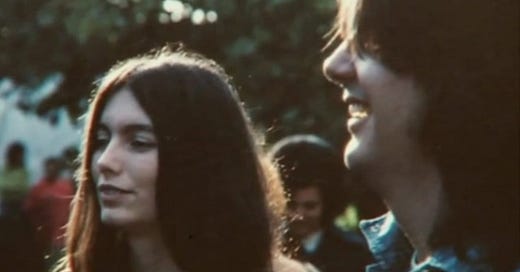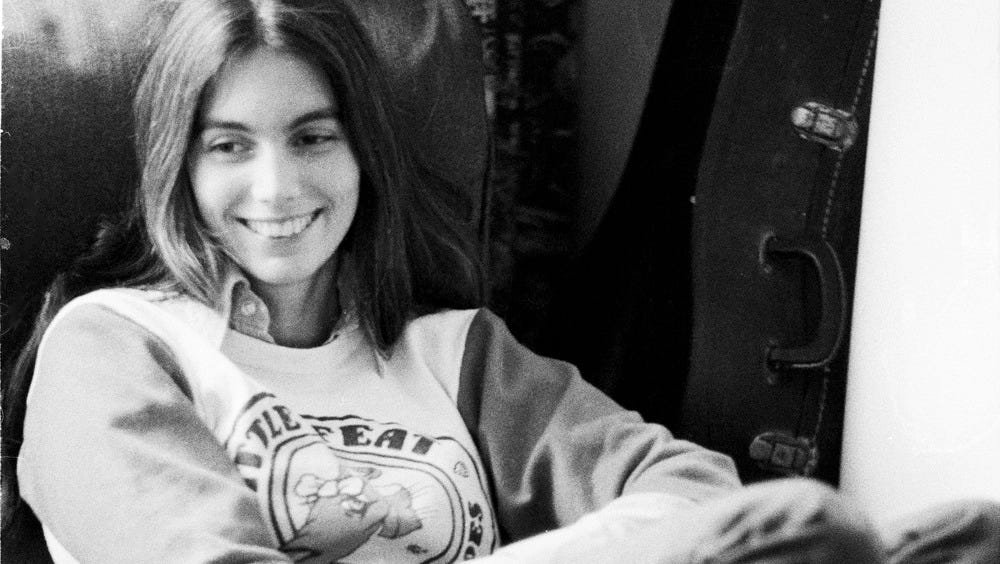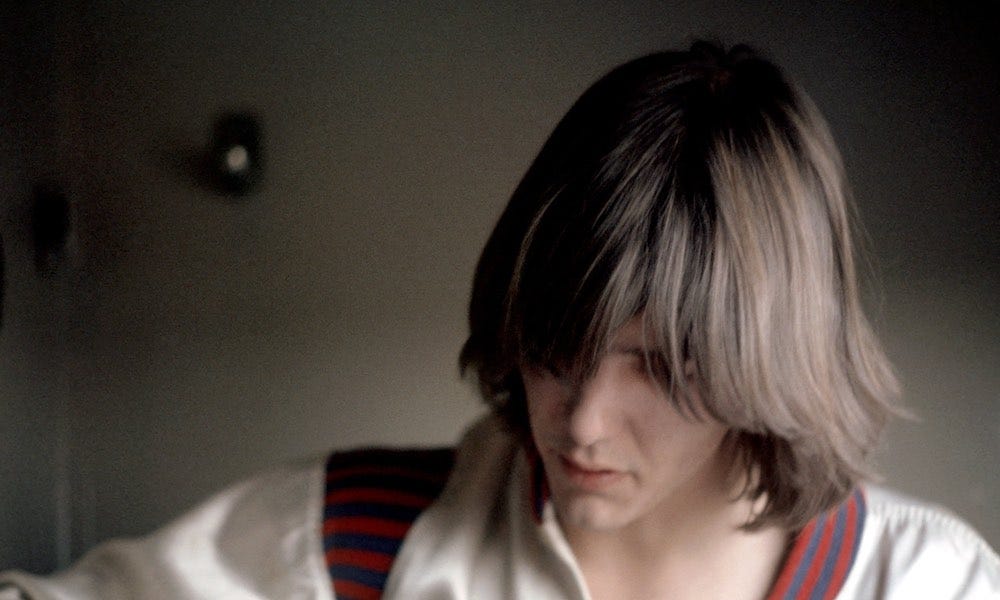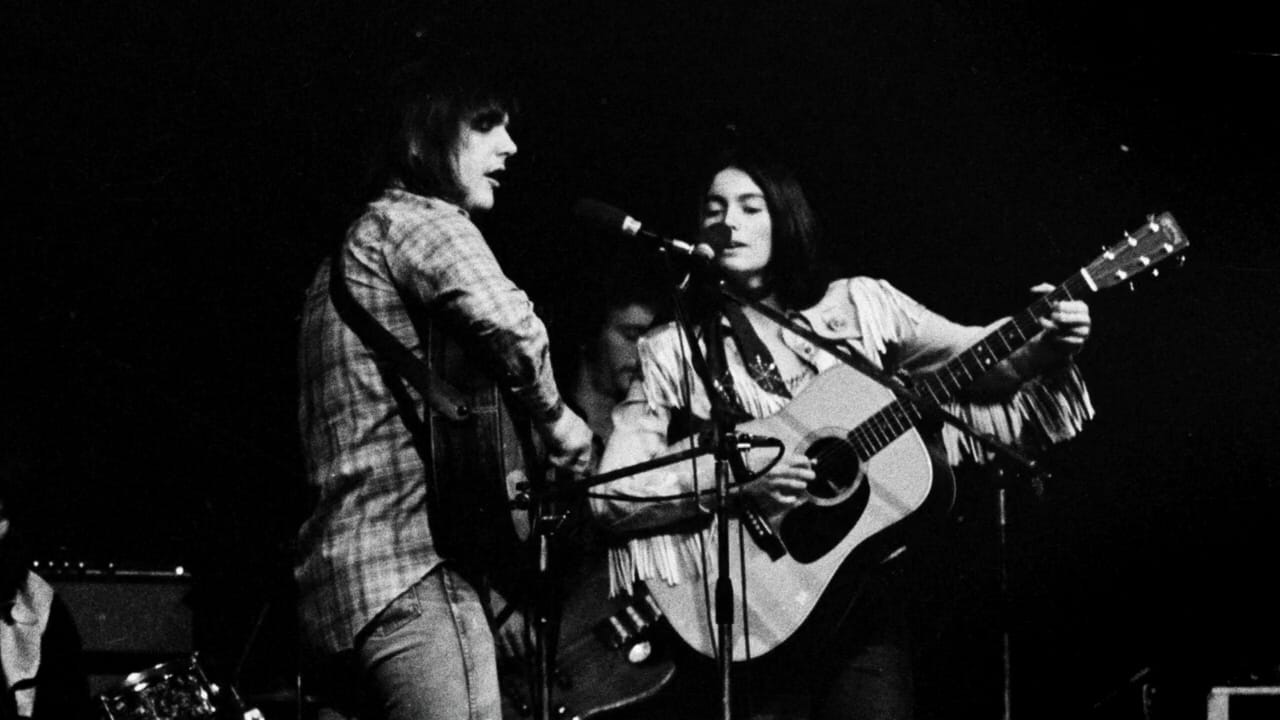(via facebook.com)
Whenever a pair of celebrities are referred to as ‘soulmates’ or ‘meant to be’ by their fans, it’s usually a lot of projection. You see this often with stars who are cast as love interests more than once or sitcom parents. In music, there’s the [mostly] happy ending for Johnny Cash and June Carter; or the adorable backstory of Marcus Mumford and Carey Mulligan reconnecting as adults after being pen pals as kids. But one duo in music who seems to continue living on are Gram Parsons and Emmylou Harris. The history on Gram and Emmylou sounds almost like the plot of a melodramatic novel. He was a rich kid from Florida with dreams of becoming a rockstar; she was from a modest, military family in North Carolina and headed out east for her own music calling. Gram and Emmy began their journeys as folkies in the 1960s, like a lot of musicians from their generation, before eventually becoming major influential figures in country-rock a decade later. It was a match made in showbiz heaven, until they were quickly fated to be ‘the ones that got away.’
(Michael Putland)
If you’re a fan of Emmylou, you’ll know it’s incredibly difficult to find her very first album, ‘Gliding Bird,’ from 1969. The brunette southerner has distanced herself so much from the record, that her fourteenth album is famously called ‘Thirteen’ (1986). This is unfortunate, because even though Emmy was screwed over by her record label at the time, and she completely changed her sound and image soon after—it’s still a lovely LP. Listening to tracks that have appeared on YouTube and other websites sporadically over the years, you can definitely hear what Gram and his peers thought was special in the songbird. After a disappointing release for ‘Gliding Bird,’ Emmy left the soon defunct Jubilee Records and started from scratch playing traditional tunes on the street and in cafes. The legend goes that Gram was introduced to Emmy in 1971 through his former bandmate, Chris Hillman, when he noticed Emmy playing in a small club in Washington, DC. Like Emmy, Gram’s career was also at a stand-still after very brief—but impactful—tenures in both the Byrds and the Flying Burrito Brothers. By ‘71, Gram was heavily invested in the speedily growing country-rock movement [or as the artist preferred to call it, ‘cosmic American music’]. He wanted a go at a solo stint after participating in bands; but he also wanted to branch out and try collaborating with a woman this time.
Unsurprisingly, Gram and Emmylou hit it off right away musically, and became equally fast friends. Those in their lives have noted there was never anything physical between the two, but they ‘made love’ on stage every night in 1972-73. Why were the pair never officially romantic if they meshed well artistically and personally? The answer to that question is where this story takes a u-turn. While Emmy was providing all the wonderful harmony and backup vocals on Gram’s solo efforts ‘GP’ (1973) and ‘Grievous Angel’ (1974), and on his subsequent, promotional tour; she was also a single mom with three-year-old daughter Hallie from a past marriage. Gram also had a child [daughter Polly, b. 1968] from a previous relationship, but his reasons for being incompatible for Emmy were because he had a bad boy image that included drugs; plus he was already married. A classic example of the right place at the wrong time. Emmy didn’t want to be associated with drugs—especially with a very young child—not to mention, she was pretty professional as a musician. Gram was actually making an effort to get clean and straighten out his public image, including with Emmy’s support, yet there was still a slight disconnect in that area. But all of this seemed to not matter when they played music. Wife Gretchen is said to have been so transparently jealous of Gram and Emmy’s creative bond, she would allegedly sabotage her husband’s concerts by cheering too loudly whenever there was a duet between the singers.
(Michael Ochs Archives)
Things came to an abrupt halt in September 1973, when Gram died overdosing on tequila and morphine during a weekend out of town in Joshua Tree, CA; relapsing after almost a year of sobriety. Gram and Gretchen were close to finalizing their divorce, and according to Emmylou in Gandulf Hennig’s documentary Fallen Angel (2004), she was planning to tell Gram she was in love with him the following week. Gretchen’s jealousy continued, even after the aspiring star’s death. Allegedly, she convinced Reprise Records to change the track listing and remove Emmylou from imagery of ‘Grievous Angel’ by the time it was posthumously released. While this sounds like it could easily be a huge BS story made up by Gram/Emmy fans; it also doesn’t make any sense why the label would snub Emmylou so much on the marketing when her vocals are all over the album.
(via facebook.com)
As we know, Emmylou went on to be a big superstar after Gram’s death, and one of the all-time great country queens behind Dolly Parton and Loretta Lynn. Gram’s legacy has gradually grown over the years after disappointing receptions as a solo artist and as a member of the Byrds and the Flying Burrito Brothers. All of his material has been revisited or discovered by music fans, and is now considered influential in both the rock and country genres, as well as a mentor to Emmy. But even now, I don’t think anyone is a bigger Gram fan than his former singing partner. Because of the country community’s strait-laced reputation at the time, the whole industry completely snubbed Gram’s contributions for being a hippie rocker who enjoyed recreational drugs and women. Ironically, country vets and old-timers absolutely love Emmy, even though Gram was a big part of her roots. Despite society loosening up over time, Gram is still not acknowledged by either the Country Music Hall of Fame or the Rock & Roll Hall of Fame fifty years later. Emmy on the other hand, has won many awards since breaking through, including a lifetime achievement honor from the Grammys and an induction in the Country Music HoF. Of course, anytime she or Gram are given retrospectives, the former sings the latter’s praises and reminds people of his inspiring work.
Emmylou’s made 30 albums, and on a big chunk of them you’ll find one or two covers of Gram’s songs. Most noticeably on her most successful LP, ‘Luxury Liner’ (1977); where the title track was originally by Gram. One of her signature songs, ‘Boulder to Birmingham’ off her 1975 record ‘Pieces of the Sky,’ is about Emmy’s grief when Gram passed. It’s interesting when we note talented and successful people in history who were initially overlooked in their field, it’s usually women. But here it’s the other way around, with Emmy practically carrying Gram’s memory on her back making sure everyone remembers him. The country scene won’t do it, Chris Hillman doesn’t seem interested. Gram’s current fanbase doesn’t seem to be under 25. It’s no shock Emmylou is probably listeners’ gateway to Gram these days. But no matter how present and future fans are reached, the output is timeless. Whether it’s Gram & Emmy’s cover of the Everly Bros’ ‘Love Hurts’ on ‘Grievous Angel,’ or Emmy’s supergroup Trio with Dolly Parton and Linda Ronstadt, or her effortlessly memorable stage presence. I’ll end this piece with a quote by Gram from an old 1973 radio interview: “She has fantastic eye contact. She can sing anything that you’re doing in perfect harmony as long as you’re looking at her. If you raise your eyebrows if you’re going up on a note, she goes right up with you in perfect pitch. She’s beautiful.”








Very interesting!
I love this piece, my two fav people. 🥹💕